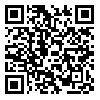Volume 19, Issue 60 (4-2018)
Zanko J Med Sci 2018, 19(60): 58-70 |
Back to browse issues page
Download citation:
BibTeX | RIS | EndNote | Medlars | ProCite | Reference Manager | RefWorks
Send citation to:



BibTeX | RIS | EndNote | Medlars | ProCite | Reference Manager | RefWorks
Send citation to:
Ansari M, Karimi M, Khaledian M. Mapping and Analysis of Co-authorship and Thematic Networks in Scientific Products of Kurdistan University of Medical Sciences in Web of Science (WOS) Database during 2011-2016. Zanko J Med Sci 2018; 19 (60) :58-70
URL: http://zanko.muk.ac.ir/article-1-340-en.html
URL: http://zanko.muk.ac.ir/article-1-340-en.html
Publication and Scientometrics center, Kurdistan University of Medical Sciences, Sanandaj, Iran
Abstract: (5456 Views)
Background and Aim: Given the importance of co-authorship and thematic networks in developing specialization and improving the quality of scientific works, the aim of this study was to map and analyze co-authorship and thematic networks in Kurdistan University of Medical Sciences in Science Citation Database during 2011-2016
Material and Method: The study population comprised of scientific productions of Kurdistan University of Medical Sciences, indexed in Web of Science during 2011-2016. HistCite and Microsoft Excel were used to analyze data. CiteSpace and Gephi software were also used to map and analyze the networks.
Results: The number of scientific productions of Kurdistan University of Medical Sciences in the examined years were 518 documents with a total of 4914 citations. The average number of citations per document was 9 citations and five writers pattern was the dominant pattern of co-authorship in these years. Cooperation index in the examined years was 5.66%, degree of collaboration was 99.0% and degree of cooperation was 98%. Researchers’ tendency to create a co-authorship network increased during 2011-2016. Canada had the highest international cooperation with Kurdistan University of Medical Sciences. In the mapped thematic network, environmental, public and professional health had the highest degree centrality and pharmacy and pharmacology had the highest betweenness centrality among the topics studied at this university.
Conclusion: Given the high level of scientific cooperation and collaboration among researchers of Kurdistan University of Medical Sciences, it is recommended to create necessary grounds for initiating and consolidating international and national cooperations and set up scientific and expert collaborative groups.
Material and Method: The study population comprised of scientific productions of Kurdistan University of Medical Sciences, indexed in Web of Science during 2011-2016. HistCite and Microsoft Excel were used to analyze data. CiteSpace and Gephi software were also used to map and analyze the networks.
Results: The number of scientific productions of Kurdistan University of Medical Sciences in the examined years were 518 documents with a total of 4914 citations. The average number of citations per document was 9 citations and five writers pattern was the dominant pattern of co-authorship in these years. Cooperation index in the examined years was 5.66%, degree of collaboration was 99.0% and degree of cooperation was 98%. Researchers’ tendency to create a co-authorship network increased during 2011-2016. Canada had the highest international cooperation with Kurdistan University of Medical Sciences. In the mapped thematic network, environmental, public and professional health had the highest degree centrality and pharmacy and pharmacology had the highest betweenness centrality among the topics studied at this university.
Conclusion: Given the high level of scientific cooperation and collaboration among researchers of Kurdistan University of Medical Sciences, it is recommended to create necessary grounds for initiating and consolidating international and national cooperations and set up scientific and expert collaborative groups.
Keywords: Co-authorship Network, Scientific collaboration, Web Of Science (WOS), Network analysis, Kurdistan University of Medical Sciences
Type of Study: Applicable |
Subject:
Special
Received: 2017/10/30 | Accepted: 2018/01/22 | ePublished: 2018/04/8
Received: 2017/10/30 | Accepted: 2018/01/22 | ePublished: 2018/04/8
Send email to the article author
| Rights and permissions | |
 |
This work is licensed under a Creative Commons Attribution-NonCommercial 4.0 International License. |






